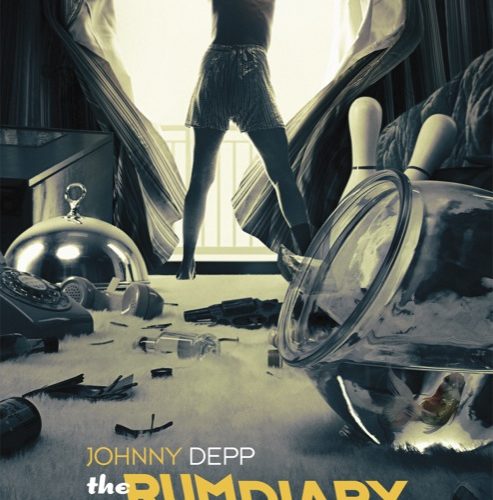By all means, Bruce Robinson‘s atmospheric adaptation of Hunter S. Thompson‘s discovered novel The Rum Diary should not work. And, in many ways, Robinson’s film is messy, meandering and, like its struggling characters, aimless. Is all this chaotic and jarring storytelling an intention on Robinson’s part? Maybe, and a lot of the film’s possible flaws come off that way.
The story follows Paul Kemp (Johnny Depp) on a journey to finding his voice in one of the most glorious hell holes on Earth: Puerto Rico. It’s a time of change there, and the dirt and grime of Kemp’s surroundings start to eat away at him and open his eyes. This kind of coming-of-age plot line is tough to swallow at first, considering how not-so-young Depp is now. The role requires someone who we can believe to be naive.
The antagonist, Sanderson (Aaron Eckhart), is attempting to take advantage of Kemp and his initially nonexistent artistic integrity. The slime ball from frame one is in the process of building a luxurious resort and needs Kemp to help spin the public’s favor his way with the power of words. At first, Kemp goes along for Sanderson’s ride. Why he does, at first, makes no sense.
Kemp is initially portrayed as weary and condescending, not as some young dope. This contradicts with his naivete towards Sanderson’s scheme, but Depp’s casting comes to make sense at a certain point. His older age becomes thematically important. Kemp mentions how he’s been carrying around a typewriter for ten years and hasn’t done anything important with it, the film suggesting a writer can find his voice at whatever age, young or old. The typewriter is a weapon, and this is where Kemp discovers how to use it.
That’s the film at its most compelling: Kemp is finding his prose and attempting to fight the bastards with ink. This powerful idea is touched on every so often, when the film isn’t running around with dull subplots, such as an out-of-place love story between Kemp and Sanderon’s girl, Chenault (Amber Heard). It’s as if Heard’s character is there only to give Kemp a reason to be a “great” guy. She never comes off as a fully-fleshed person with any narrative importance.
What’s more, Chenault is a bloat to the pacing, which is already inflated by other unnecessary sequences. But then, that said bloat may be present to further put the viewer into Kemp’s point-of-view. Robinson captures his hero’s world view and how Puerto Rico impacts him richly. When all is said and done, Kemp becomes the serious writer he once aspired to become, leaving behind his goofball ways in Puerto Rico as he sails away to more journeys of chaos and battling corruption with ink.
The Rum Diary best works as a “hangout” movie with a group of mild and surprisingly human eccentrics, including a tonally daring performance by Giovanni Ribisi and the likable presence of Michael Rispoli. There may be a lot of time with the gang doing nothing and indulging in incoherent rambling, but there’s always a good time to be had and, every so often, one of those rambling eccentrics has something unique to say.
The Rum Diary is now in wide release.



